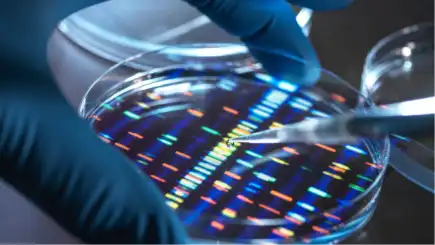Learn about DNA with online courses and programs
What is DNA?
DNA, or deoxyribonucleic acid, is a molecule that carries the genetic instructions necessary for the development, functioning, and reproduction of all known living organisms. It is found in the cells of every organism and serves as a blueprint or code that determines an organism's traits and characteristics.
The study of DNA, known as genetics, encompasses various branches and subfields. These include genomics, molecular genetics, medical genetics, and more.
Advancements in DNA sequencing technologies, such as next-generation sequencing, have revolutionized the field of genetics, enabling the analysis of entire genomes with greater speed and accuracy. The study of DNA has profound implications in fields like personalized medicine, agriculture, evolutionary biology, conservation, and biotechnology.
Browse online DNA courses
DNA course curriculum
Through a class about DNA, you might gain a solid foundation in the structure, function, and applications of DNA, providing a basis for further exploration in genetics, molecular biology, biotechnology, and related fields. Some examples of concepts that could be covered in an introductory DNA class include:
Methods that identified DNA as the genetic material
Structure of DNA
Location-specific DNA expression
Process of DNA replication
Genetic code
Mechanisms by which gene expression is controlled
Start building the knowledge you need to work in the genetics field with edX. From accelerated boot camps to comprehensive programs that allow you to earn a bachelor’s degree or (for more advanced learners) a master’s degree, there are many different learning formats available to fit your needs. Busy professionals can even take advantage of executive education courses tailored to those in leadership and management positions. Find the right course for you.
Explore jobs related to DNA
The field of genetics and molecular biology continues to advance rapidly, providing numerous opportunities for individuals interested in understanding and working with DNA. Some examples could include:
Geneticist: Study genes and genetic variations to understand their impact on traits, diseases, and populations. They conduct research, analyze genetic data, and contribute to advancements in the field of genetics.
Molecular biologist: Study the structure, function, and interactions of molecules within cells, including DNA. They conduct experiments, analyze DNA samples, and investigate biological processes at the molecular level.
Biotechnologist: Apply knowledge of DNA to develop new products, processes, and technologies. They work on areas like genetic engineering, gene therapy, genetically modified organisms (GMOs), and biopharmaceutical production.
Genetic counselor: Provide guidance and support to individuals and families regarding genetic disorders, testing, and reproductive options. They help interpret genetic information, assess risk factors, and communicate implications to patients.
Each of these roles will have different education and skills requirements. Some employers may seek candidates with a degree in biology depending on the role. Before deciding on a specific learning path, research the positions you hope to pursue and align your coursework with your career goals.

